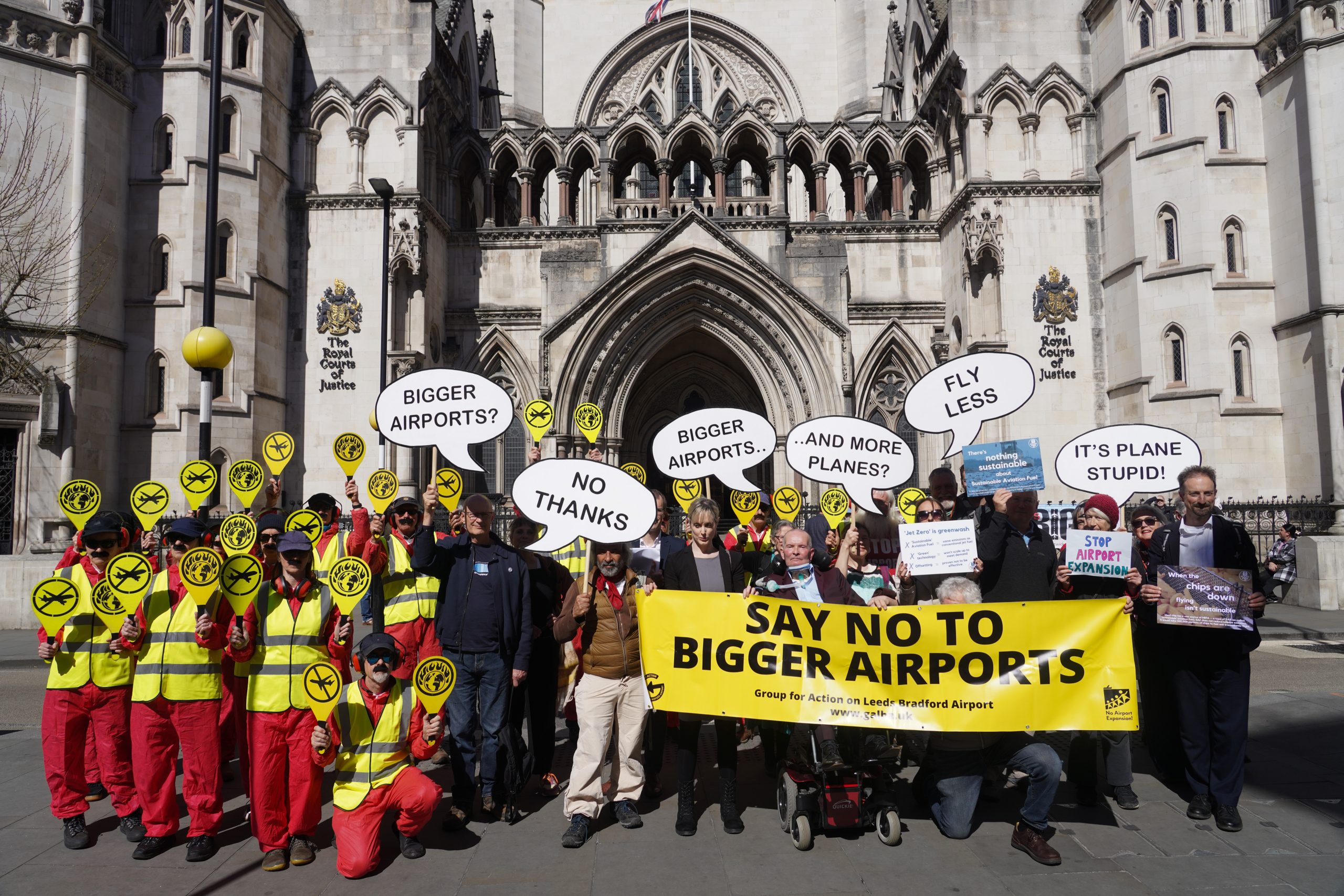In the UK the government is throwing its full weight behind airport expansion using the narrative of ‘economic growth’ to justify it while claiming that the climate impact can be addressed through false solutions. It’s a trend we’re seeing across the world as airport growth continues. In this piece Tim Prior looks at how the UK government’s approach to aviation is completely at odds with their own climate reduction targets.
The Climate Change Committee has submitted its 2025 ‘Progress in Reducing Emissions’ update report to Parliament. It states that emissions in the UK have been steadily decreasing, with levels in 2024 50.4% below those of 1990. However, it also states that the recorded reduction in emissions in 2024 was partly offset by an increase in emissions from flying, and that future emissions growth in this sector could put future targets at risk.
The UK’s Flight Emissions Are Going in the Wrong Direction
The report notes that carbon emissions from flying are increasing unsustainably and are undermining the progress made by reducing emissions in other sectors. It recommends ‘developing policy that ensures that the aviation industry takes responsibility for its emissions reaching net zero by 2050.’ Let’s be clear, even the current number of flights are unsustainable, as all of the solutions currently put forward that feed into net zero assumptions are not sustainable at scale. Details of these solutions are listed below.
As we all know, the decisions made, and the lack of effective, joined up policy, by successive governments have flown in the face of this recommendation, and the airline industry is taking full advantage. Allowing many regional airports to increase capacity, the lack of an effective emissions tax (or Frequent Flying levy), the use of so-called “Sustainable Aviation Fuel” as a delay tactic, and the approval of airport expansions – including Gatwick and Luton – means that this unsustainable increase in future flight emissions are being baked in.
The CCC’s analysis of “sustainable” passenger numbers for Net Zero by 2050
In a recent report on UK Airport Expansions the Aviation Environment Federation (AEF) reported on the Climate Change Committee’s analysis, published in February 2025, showing that in order for aviation demand growth to be Net Zero compatible, annual passenger numbers at UK airports should not increase beyond 400m by 2050 (representing a 37% increase on 2024).1
In the near-term, the CCC’s analysis allows for no growth before 2030, only a 2% growth by 2035 and 10% by 2040, all measured against predicted 2025 passenger numbers. The report says this would allow new technologies and alternative fuels to scale to before significant passenger growth increases the size of the decarbonisation challenge. This is termed the ‘Balanced pathway for Aviation’.
However as the AEF report points out, many of the projections and predictions that allow for this ‘balanced pathway’ are uncertain, and rely on false solutions – greenwashing promises of technology that is as yet unproven at scale and would take resources away from the people and sectors that need them most. These are things such as: synthetic fuels; the roll out of hybrid-electric and battery-electric aircraft; and engineered atmospheric carbon removals (for example carbon storage and capture, for which the aviation industry would pay in an attempt to offset their continuing carbon emissions in the skies). Yes, even in 2050 the airline industry is predicted to have substantial greenhouse gas (GHG) emissions – estimated by the CCC to be a whopping 60% of the total engineered removals!
As the greenwashing factsheet series shows, the aviation industry actively misleads and distracts with these promises of technological solutions, greenwashing the growth they are planning in the coming decades. This growth would potentially equate to an eye-watering doubling of GHG emissions from aviation globally by 2050.2
It gets worse…..
Opening the door for even more expansion plans
Since 2018, a number of expansion plans have been submitted, or approved. If these expansion plans, including Heathrow, all go ahead, the total passenger capacity of UK airports could rise to 529 million passengers per year.3 If fully utilised, this would represent an increase of more than 70% compared to 2018 passenger levels.4 The CCC’s latest report to government clearly shows that these numbers are unsustainable – demand cannot be allowed to increase by this amount without blowing any hope of Net Zero by 2050 for the aviation industry!
There are two things important things to note here: Firstly, that the CCC’s report is overly-optimistic in its assumptions and what is really required is a large reduction in today’s passenger numbers. Secondly, it shows why the goal of ‘Net Zero by 2050’ is itself problematic – industry and policy makers claim to be committed to reaching reduction goals set far in the future and use them as a delay tactic to continue making decisions which fly in the face of the reductions needed. What’s more, these goals often rely on using unproven and resource intensive technology to reach them.
In the Government’s policy document ‘Update on Airport Expansion’, published Jan 2025, it makes the economic case for capacity increases and airport expansion at London City (approved), Stanstead (approved) and Heathrow airport (approval pending). It does not mention recently approved capacity expansions at Bristol and Luton airports, which give a current approved increase of around 16 mppa (million passengers per annum).5 If Heathrow and Stanstead’s expansion plans are also approved another 65 mppa will be added to the total.6 Other regional airports are presenting their own expansion plans, emboldened by the current ‘approvals climate’.
Basically, it now appears to be an ‘airway free for all’ in the name of perceived economic growth, with scant regard for the UK Government legislated commitment to net zero by 2050.
But it’s not too late
If enough pressure is put on the government to stop the above pending approvals then we can substantially limit the damage being done by the aviation industry. For example, Heathrow is not expected to put forward an official planning application until 2028, after the Government has updated the evidence and looked through the proposals recently submitted. Next year, the Stay Grounded network will be focusing on supporting groups demanding an end to airport expansion with our new Red Lines for Airports campaign. Follow our channels to keep updated with the campaign and find out how you can get involved.
FOOTNOTES:
- https://www.aef.org.uk/uk-airport-expansions/
- https://e6uhggesiax.exactdn.com/wp-content/uploads/2025/11/SG_factsheet-Net-Zero_2022.pdf
- https://www.aef.org.uk/uk-airport-expansions/
- https://www.aef.org.uk/uk-airport-expansions/
- https://www.aef.org.uk/uk-airport-expansions/
- https://www.aef.org.uk/uk-airport-expansions/



